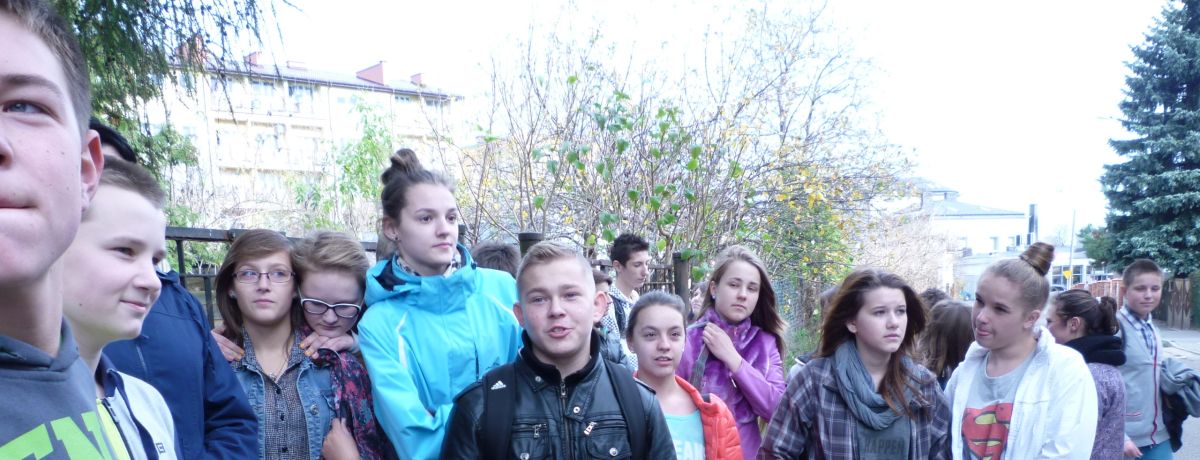| 2013 |
Mława
Józef Ostaszewski Junior High School No 2


| 2013 |
“We once were neighbours…” We lived together in Mława from the 15th century. Even though in 1776 many of you left Mława when the fire burnt down a lot of buildings in the town, but another generation resettled in Mława. You had a synagogue here, first it was wooden, and then made of brick. In your shops around the market square one could buy salt, leather, nails, strings, sometimes tea and silk. You had bakeries with beautifully smelling challah, shoe repair and tailor’s workshops. After the First World War, you established sawmills, factories and plants. But still many of you did not manage well, some left to the United States and Argentina to seek a better life. But, a minute before the War your were one third of us. When in December 1939 Germans crossed the borders, they burnt down the synagogue and you were transported to the camp in Działdowo. The following year, you were transported to Biała Podlaska, Kosów Lacki, Winnica, Michałów Lubelski. A ghetto was established in our town. You were gathered within Warszawska, Długa, Płocka and Szewska Streets. We were separated with the brick and barbed wire fence. In 1942 you were transported to Auschwitz and Treblinka. After the War, we saw only a few tens of you, you did not want to stay…
“We once were neighbours”, this is the title of the project implemented by the students from the junior high school in Mława.
We do still remember you, they seem to say. We know that there once was a synagogue in Kozia Street, the Jewish Junior High School in Sienkiewicza Street, and a school for Jewish girls in Smolarna Street. That you published “Nasza Trybuna”, and boys played football in “HaGibbor” and “HaPoel” teams. Thanks to the School of Dialogue workshops students joined the dialogue. The dialogue with history, local space, their own identity.
Following the activities with educators, young people were encouraged to act and share the knowledge they acquired. They organized their own tour around the town and a multimedia show. They invited other students and representatives of authorities. A local newspaper published an extensive article concerning the project of the School of Dialogue. In order to prepare the meeting and the tour, young people read publications and articles concerning the life of Jews in Mława and met Mława region experts from which they obtained old photographs presenting people living there in the past.
The tour following the footsteps of Jews of Mława was attended by Krzysztof Jakubowski, a historian and journalist, Andrzej Mocek, co-organizer of the renovation of the Jewish cemetery in Mława, Magdalena Grzywacz, a spokeswoman of the Town Offices, and Janina Budzichowska, Deputy Mayor. The tour contained the elements of game which activated its participants.
The participants acquired knowledge while solving riddles and rebuses, and while searching hidden information. The tour began at the Jewish cemetery where young tour guides showed archival photographs of Jewish gravestones in Mława from the interwar period. Using the information acquired during the workshops, the junior high school students shared their knowledge about Jewish funerary customs, and they discussed the signs and symbols placed on the gravestones. Mr. Andrzej Mocek told them about the history of reconstruction of the cemetery. Another point of the tour involved Warszawska Street, former Żydowska (Jewish Street). Young people told there about everyday life of Jews and their typical occupations. In Warszawska Street, they pointed to the building which was used as a hospital in the Jewish ghetto. At this very spot, the junior high school students tried to make their friends aware of how dramatically the World War II changed the everyday life of Poles and Jews. Józef Witwicki, a citizen of Mława, was presented as an example of dignity and unconditional help to others. Then, the tour moved to Smolarna Street where a high school for Jewish girls once stood and guides told the others about the structure of Jewish schools in Mława before the War. Next, they reached 18-Stycznia Street where football fans listened even more carefully, as a family of the famous football coach, i.e. Avram Grant lived in the building in this street.
Szewska Street was another stop during the walk, since, as students emphasised, in the interwar period there operated the craftsman’s workshops owned by Jews, whereas during the World War II it was one of the streets in a ghetto. There were told stories about people’s dramas and inhuman conditions which Germans created in a ghetto, where everyday life involved violence, cruelty and hunger. In Zduńska Street, they showed a building were Judenrat headquarters were located. The tour following the footsteps of Jews of Mława ended at the corner of Płocka and Grzebskiego Streets where a plaque commemorating victims of mass executions by Germans against Jews is located. There, students read witnesses’ accounts about the execution – told by the Jews from the ghetto in Mława who survived the hell of the war.
“We once were neighbours” – this project changed the junior high students from Mława: “Now I look at the world differently; I knew before that I should accept other people, now I know how important it is to have a dialogue with others. My perception of the world somehow changed”, says Dominika, a participant of the School of Dialogue in Mława.
During the workshops, I realized that all human beings are the same, despite their religion, culture or customs. I already know now how important it is to cooperate with others and develop the project. I could also learn a lot about my town, acquiring the information I did not know before.
Dominika, workshops participant

School:
Józef Ostaszewski Junior High School No 2
Students:
2nd year students
Teachers:
Ewa Kowalska, Joanna Wydra
Expert:
Krzysztof Jakubowski
Educators:
Katarzyna Czajkowska-Łukasiewicz, Stanisław Niemojewski
Project co-financed from the funds granted by The Pratt Foundation.

In appreciation to Friends of the Forum for supporting the School of Dialogue educational program.
